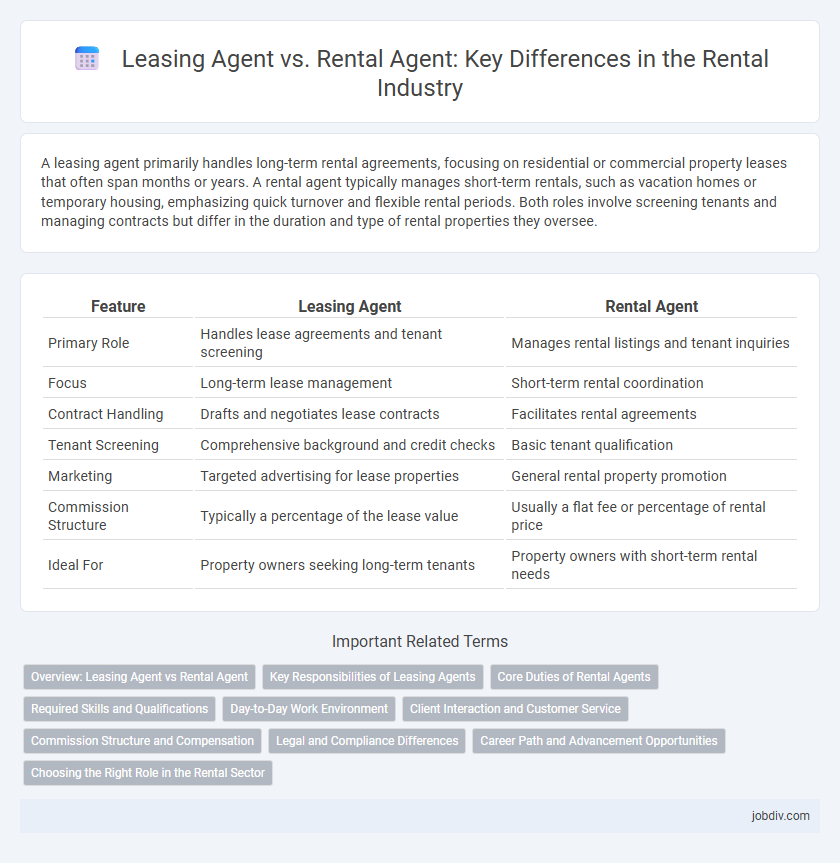A leasing agent primarily handles long-term rental agreements, focusing on residential or commercial property leases that often span months or years. A rental agent typically manages short-term rentals, such as vacation homes or temporary housing, emphasizing quick turnover and flexible rental periods. Both roles involve screening tenants and managing contracts but differ in the duration and type of rental properties they oversee.
Table of Comparison
| Feature | Leasing Agent | Rental Agent |
|---|---|---|
| Primary Role | Handles lease agreements and tenant screening | Manages rental listings and tenant inquiries |
| Focus | Long-term lease management | Short-term rental coordination |
| Contract Handling | Drafts and negotiates lease contracts | Facilitates rental agreements |
| Tenant Screening | Comprehensive background and credit checks | Basic tenant qualification |
| Marketing | Targeted advertising for lease properties | General rental property promotion |
| Commission Structure | Typically a percentage of the lease value | Usually a flat fee or percentage of rental price |
| Ideal For | Property owners seeking long-term tenants | Property owners with short-term rental needs |
Overview: Leasing Agent vs Rental Agent
Leasing agents primarily focus on securing long-term rental agreements, managing lease paperwork, and ensuring tenant qualification for residential or commercial properties. Rental agents handle short-term rental transactions, often dealing with vacation homes or temporary housing, emphasizing quick turnover and short-duration stays. Understanding the distinction helps landlords and tenants select the appropriate professional for their leasing or rental needs.
Key Responsibilities of Leasing Agents
Leasing agents primarily handle tenant screenings, lease negotiations, and property showings, ensuring that rental agreements comply with local laws and property management standards. They coordinate with property owners to market vacancies effectively and maintain strong tenant relations to encourage lease renewals. Rental agents, in contrast, often focus more broadly on facilitating rental transactions, but leasing agents specialize in contract execution and tenant management.
Core Duties of Rental Agents
Rental agents focus on showing properties, screening potential tenants, and processing lease applications to ensure compliance with rental criteria. They handle rent collection, coordinate maintenance requests, and address tenant concerns to maintain positive landlord-tenant relationships. Their core duties prioritize tenant satisfaction and property occupancy, distinguishing them from leasing agents who primarily manage lease negotiations and agreements.
Required Skills and Qualifications
Leasing agents require strong communication, negotiation, and customer service skills, along with knowledge of property management software and housing laws. Rental agents must possess similar customer service abilities but often need expertise in marketing, tenant screening, and lease agreement preparation. Both roles typically require a high school diploma or equivalent, with leasing agents sometimes needing real estate licenses depending on state regulations.
Day-to-Day Work Environment
Leasing agents primarily manage property showings, tenant screenings, and lease agreements within residential rental communities, often working in an office or on-site environment. Rental agents focus on matching tenants with available properties across multiple locations, handling inquiries, and negotiating short-term rental terms, usually operating in a real estate office or remotely. Both roles require strong communication skills, but leasing agents engage more directly with property management teams, while rental agents interact frequently with property owners and prospective tenants.
Client Interaction and Customer Service
Leasing agents primarily focus on securing tenants by showcasing properties, explaining lease terms, and processing applications, emphasizing a proactive approach to client interaction. Rental agents handle ongoing tenant relations, addressing maintenance requests and resolving disputes, ensuring consistent customer service throughout the lease term. Both roles require strong communication skills to maintain tenant satisfaction and promote lease renewals.
Commission Structure and Compensation
Leasing agents typically receive a commission based on a percentage of the total lease value, often ranging from 50% to 100% of the first month's rent, incentivizing long-term tenant placement. Rental agents usually earn a flat fee or a smaller percentage per transaction, as their focus is on short-term rentals or individual lease agreements. Compensation structures reflect their roles: leasing agents benefit from ongoing relationships and higher commissions, while rental agents gain faster, transactional income from frequent turnovers.
Legal and Compliance Differences
Leasing agents primarily handle residential or commercial lease agreements, ensuring compliance with specific landlord-tenant laws and fair housing regulations, while rental agents may oversee general property rentals, including short-term and vacation rentals, which are governed by different legal frameworks such as hospitality and occupancy laws. Leasing agents must be knowledgeable about lease contract details, security deposit rules, and eviction procedures, whereas rental agents often manage booking terms, transient occupancy taxes, and insurance requirements. Understanding these legal and compliance differences is critical for maintaining regulatory adherence and protecting both property owners and tenants.
Career Path and Advancement Opportunities
Leasing agents primarily focus on securing tenants for residential or commercial properties, which often serves as an entry point into the real estate industry with opportunities to advance into property management or sales roles. Rental agents typically handle short-term rental agreements and may advance by specializing in vacation rentals or corporate housing, expanding their expertise in client services and market trends. Both career paths offer advancement through gaining licenses, certifications, and experience, with potential to move into higher-level positions such as property manager, leasing manager, or real estate broker.
Choosing the Right Role in the Rental Sector
Leasing agents focus on securing long-term tenants by managing lease agreements and tenant screening, while rental agents handle short-term rental inquiries and property showings. Choosing the right role depends on expertise in lease negotiation or customer service and the specific property market, such as residential versus vacation rentals. Understanding these distinct responsibilities helps maximize efficiency and client satisfaction in the rental sector.
Leasing Agent vs Rental Agent Infographic

 jobdiv.com
jobdiv.com